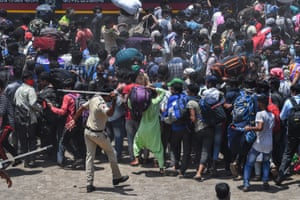As the monsoon lashes Mumbai and black clouds darken the skyline, the city is in the grip of nostalgia for the men who used to keep daily life ticking as rhythmically and comfortingly as a Swiss watch. Men who are missing.
The men who cleared the drains of silt so that the rains don’t cause flooding and water-borne diseases such as leptospirosis. The electricians who came to fix breakdowns caused by wind and rain. The sanitation workers who used to spray neighbourhoods with mosquito repellent before the monsoon to prevent vector-borne diseases such as malaria, dengue fever and chikungunya. All are missing even though the monsoon officially arrived last weekend.
Many of these workers and handymen were migrant labourers. They fled the city when the pandemic left them destitute and hungry. “Although the government of Maharashtra boasted it was giving them cooked meals, it used to deliver 5,000 food packets for 10,000 people. Families starved,” said Sarita Sable, a voluntary worker in Dharavi slum.
Before their mass exodus, well-heeled residents had never noticed them. They were always there, cheap cogs tucked away in the crevices of the city, their presence visible only when needed to fix a blocked toilet or deliver pizzas, and instantly forgotten.
Now their absence is felt. A city already buckling under coronavirus and facing the annual ritual of catastrophic flooding from the rains is realising its dependence on daily wage labourers.
For the average family, the fruit and vegetable vendors parked so conveniently on the road outside their homes in a high-rise are absent. Lots of other “wallahs” are also gone: the chai wallah pouring out steaming masala tea from old-fashioned metal teapots, the juice wallah serving oxidant-rich pomegranate juice, the press wallah who ironed your clothes and delivered them, neatly folded and wrapped inside a sheet like a gift, to your door, and the autorickshaw wallah who dropped your child off at school.
Rekha Sabharwal, whose family manufactures ceiling fans, said the words of Joni Mitchell’s song Big Yellow Taxi – Don’t it always seem to go, that you don’t know what you’ve got till it’s gone – keeps going around in her head. “Now they aren’t around, I realise they made up the sights and sounds of the city. When I can’t get a plumber or the grocery store owner says he hasn’t got any delivery boys, I get frustrated,” she said.
Worst of all perhaps for a city that loves home-cooked food for lunch, the famous dabbawallas (yet another wallah) have also disappeared. These men have been studied by Harvard for their logistical feat in picking up lunch from a customer’s home and dropping it off at their office, armed only with a unique code for every lunchbox, and rarely getting any delivery late or wrong.
For the first time in 125 years, most of the 5,000 dabbawallas have gone home to their villages, defeated by the virus and the lockdown. Given the nature of their work, involving contact with dozens of people on public transport to deliver some 200,000 lunchboxes every day, who was going to hire their services in the middle of a contagion?
Apart from the labour shortage whittling away all the little comforts that make daily life pleasant, industrialists are also frustrated. They are gearing up for business again as the city gradually starts easing the lockdown but cannot find guards, technicians, electricians, sweepers, packers or assembly-line workers.
Foundries, mills, shops and malls are looking for labour. Construction of roads, flyovers and metro lines is delayed. Half-built buildings need to be finished. A survey carried out by staffing firm TeamLease Services for the Economic Times newspaper estimates a labour shortfall of 40–50%. The city authorities estimate that 1.2 million migrant workers left the city during lockdown.
The chief minister of Maharashtra, Uddhav Thackeray, has expressed concern that the city’s infrastructure projects should not be delayed. He has urged employers to hire local workers rather than those from other states. Few want to take him up on this suggestion.
“Migrant workers accept less pay, longer hours and harsher working conditions. Local people will not tolerate this – they have a sense of justice, are rooted in society and enjoy social support. Migrant labourers are herded into factories and hostels and feel cut off and isolated from the society around them,” said DL Karad, national vice-president of the Centre of Indian Trade Unions.
He is amused at how employers, many of which ignored migrant workers at their time of greatest need, are now desperate for them to return. Employers have sent out “contractors” who, for a commission, scour villages in the states around Mumbai for skilled and semi-skilled workers to work for daily wages.

“Most of them aren’t coming back. First they were treated like slaves by employers and then they were treated like stray dogs by society during the lockdown. Some, perhaps, may return. But only if they are starving,” said Karad.
For the moment, the immediate concern is the drains. By now, the city’s 2,900km drain network (which dates to British times) should have been cleared of silt and debris in preparation for the monsoon flooding to avoid people having to wade through filthy water up to their waists.
The annual deluge invariably leads to hospitals being besieged by people with water-borne diseases, particularly those from densely populated areas and slums. This year, with hospitals buckling under the strain of coronavirus, the health system might just collapse if it has to cope with monsoon-related diseases too.
“Though some work has been done on de-silting the drains, a lot still remains because of the manpower shortage. The biggest concern is the low-lying areas which flood first,” said Ashwini Thakur of Mumbai First, which works to improve the quality of life in the city.
“We are just hoping for the best.”
Source: https://www.theguardian.com/global-development/2020/jun/19/mumbai-discovers-life-isnt-so-sweet-without-the-workers-it-once-ignored


